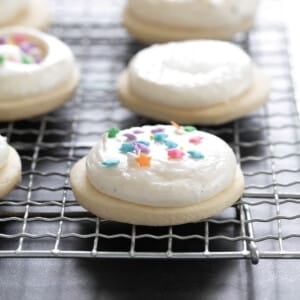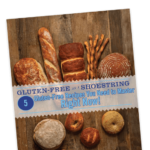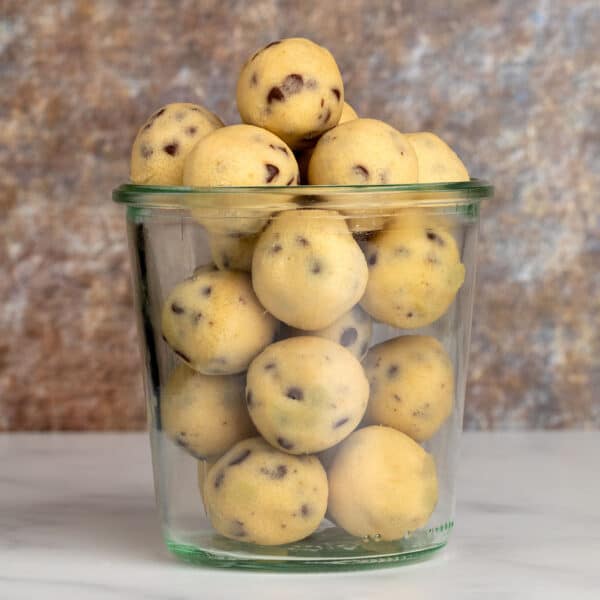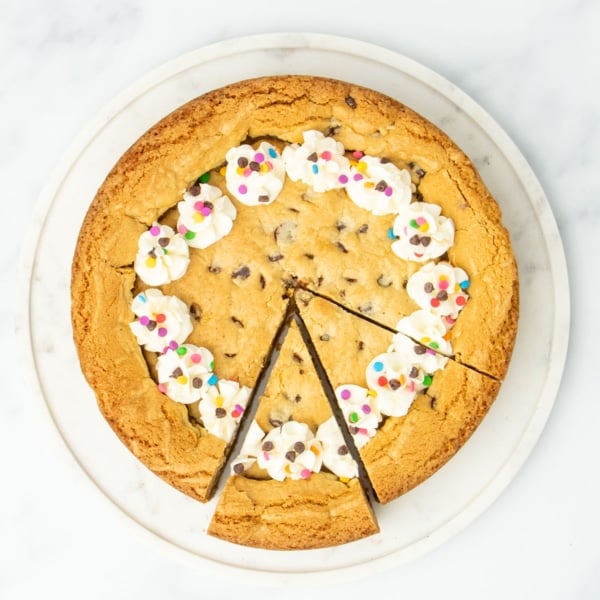This post may contain affiliate links. Please read our disclosure policy.
These tender, lightly sweet gluten free sugar cookies are soft but not fragile, so they'll hold any shape you can imagine—all without chilling the dough so they're done in 30 minutes start to finish! With just the right balance of ingredients, there's no need to wait to roll out the dough and get these perfect cut-out cookies in the oven.
This recipe has become a staple at the holiday celebrations, baby showers, and birthdays of hundreds of readers for years. Every time you see the Lofthouse cookies in the clamshell box at the grocery store that you can't have any more, remember these perfect, no-planning-ahead cookies and roll on by!

“This was the first GF sugar cookie recipe I’ve tried and I can assure you that my search is off! This will be my new go to!”
“Brought the cookies with decorating supplies to family Christmas and they were a hit! Everyone was surprised that they are gluten free!”
Why this recipe works
Unlike other similar recipes you'll find, the dough for this recipe for gluten free sugar cookies the dough is made in one bowl, with no chilling needed.
You'll still get soft, tender cookies that are lightly sweet with lots of vanilla flavor. And they'll hold any shape, from rounds and basic Christmas stars to Valentine Hearts, spring flowers and Easter bunnies, all without making the dough in advance.
These cookies melt-in-your-mouth, but they're thick enough that they won't break. I've even shipped them across the U.S. (with icing, not frosting), and they arrived looking perfect!
Cookie ingredients explained
Here's the role of each ingredient in this simple cookie recipe:

- Gluten free flour: You need an all purpose gluten free flour blend that has enough structure for a cookie that holds its shape and isn't fragile, with a smooth rice flour to avoid any grit. I recommend Better Batter's original blend gluten free flour and Nicole's Best multipurpose blend (with added xanthan gum). Bob's Red Mill 1-to-1 Gluten Free Baking Flour in the blue bag also works, but be sure to add an extra 1/4 teaspoon xanthan gum to the dry ingredients to avoid crumbly cookies.
- Baking powder – Helps the cookies puff out and spread a bit so they're not dense or hard.
- Sugars – Granulated sugar sweetens and tenderizes the cookies and a touch of powdered or confectioners' sugar help them hold their shape.
- Butter – Adds tenderness, flavor, and moisture to bring the dough together.
- Egg – Binds the cookie dough together, the white adds structure to hold the rise, and adds richness from the yolk.
- Vanilla extract – Adds depth of flavor to these cookies with an otherwise pretty subtle flavor.
- Salt – Enhances other flavors, and helps balance the sweetness.

How to make gluten free sugar cookies
These easy cookies are made in one mixing bowl by starting with dry ingredients, then mixing in wet. Whisk together the gluten free flour blend with xanthan gum, baking powder, salt, granulated sugar, and confectioners' sugar to ensure an even distribution of all dry ingredients, avoiding pockets of baking powder.
We use the reverse cream method to avoid incorporating any extra air into the cookie dough, so the cookies bake flat but still very tender. Do this by pressing the softened butter into the dry ingredients with the back of a spoon until it looks like coarse sand.
Add a beaten egg and vanilla extract to moisten all of the dry ingredients. Keep working until everything looks uniform, then knead together with clean, dry hands just until smooth without overworking the dough. That will overactivate the xanthan gum and could result in tougher cookies.




Sprinkle the cookie dough very lightly with more gluten free flour to keep it from sticking as you roll it out about 1/3-inch thick without drying out the dough.
Use cookie cutters to cut out shapes by pressing straight down. Make sure the cookie cutter doesn't have any cookie dough on the edge each time so you get clean edges for cookies that hold a well-defined shaped edge and rise up, not out.
Pull away the rest of the dough to expose the shapes rather than pulling out the shapes, which might stretch them out of shape. Pick up the shapes and place them on a lined baking sheet. Gather the dough gently into another disk, reroll and cut out more shapes.




Bake at 350°F for less than 10 minutes, just until set, with little to no browning to ensure that the cookies stay very tender, without crisping. Let them cool on the baking sheet for a few minutes until stable enough to move to a wire rack to cool completely.




Frost with the meringue buttercream frosting or royal icing, or leave plain. Store in a sealed glass container at room temperature, and they will keep their texture for about 1 week since glass doesn't retain any moisture.

Expert Tips
Measure your ingredients by weight
You’ll find that the dough resembles moist crumbs and clumps, and you might be tempted to add more moisture. Make sure you’re measuring your ingredients (especially the gluten free flour) by weight, not volume, for precise results. If you add too much moisture, your cookies will spread out, instead of just up, creating distorted shapes.
Use cool room temperature butter
The term “room temperature” for butter, eggs, and other baking ingredients usually means about 68°F. Here, if the butter is below about 70°F, it may be difficult to work into the dry ingredients evenly.
To soften cold butter, chop it into small pieces and let it sit on the counter for about 20 minutes. Be sure your eggs are at room temperature (gloat them in very warm water during that time, too if not), or they'll make the butter clump.
Knead the dough until smooth
Once you reach a uniform mixture that resembles moist crumbs and clusters, knead the dough with clean hands just enough to bring it together before rolling it out. You can also use a stand mixer with a paddle attachment to make smooth dough easily, but avoid a handheld mixer with beater attachments or your cookies will have too much air.
Decoration tips
Spoon a generous amount of frosting on the top of a cookie in a mound. Moisten a small spoon, insert it into the center of the frosting at an angle and swirl lightly in a circle.
For classic Lofthouse-style frosting, use a small moistened offset spatula or a simple wide butter knife to flatten a mound of frosting into a disk.
Always let the frosting to set at room temperature until it becomes semi-hard so it's not so fragile.
For a truly hard surface, use royal icing in place of frosting. To decorate sugar cookies, I use a #4 piping tip to outline and then “flood” the center, sprinkling decorations immediately before the icing has dried.
Store in glass containers
To maintain the texture of the cooled cookies, with or without frosting or icing, store them in a glass container with a tight-fitting lid. They won't absorb moisture or odors from the environment.

Ingredient substitutions
Dairy free
I've used block-style vegan butter like Melt or Miyoko's Creamery brand in the cookie dough before with success. The edges of the gf sugar cookies aren’t quite as clean as they are when you use butter, but the recipe tastes and looks great overall.
Try replacing the butter in the frosting recipe with Spectrum brand butter-flavored nonhydrogenated vegetable shortening. For the milk in the frosting, use any unsweetened unflavored nondairy milk (I like almond milk).
Egg free
You should be able to replace the egg with a “chia egg,” Bob's Red Mill egg replacer, or “Just Egg” liquid refrigerated plant egg.
Meringue powder
Meringue powder is made of egg white powder, sugar, a starch, and some stabilizers. If you can’t have eggs, I’d just eliminate meringue powder as an ingredient altogether. The frosting will just be a bit softer.
Gluten Free Sugar Cookies Recipe

Equipment
- Stand mixer or handheld mixer
Ingredients
For the cookies
- 2 cups (280 g) all purpose gluten free flour blend, (See Recipe Notes), plus more for sprinkling
- ¾ teaspoon xanthan gum, omit if your blend already contains it
- ¾ teaspoon baking powder
- ¼ teaspoon kosher salt
- ½ cup (100 g) granulated sugar
- 3 tablespoons (22 g) confectioners’ sugar, or powdered sugar
- 8 tablespoons (112 g) unsalted butter, at soft room temperature (about 70°F)
- 1 (50 g (weighed out of shell)) egg, at room temperature, beaten
- 1 teaspoon pure vanilla extract
For the frosting
- 10 tablespoons (140 g) unsalted butter, at room temperature
- ¼ cup (2 fluid ounces) milk, at room temperature
- 1 tablespoon pure vanilla extract
- ⅛ teaspoon kosher salt
- 2 teaspoons meringue powder, LorAnn and AmeriColor brands are gluten free
- 4 cups (460 g) confectioners’ sugar
- Seeds from one vanilla bean, optional
- Sprinkles, optional
Instructions
Make the cookies
- Preheat your oven to 350°F. Line rimmed baking sheets with unbleached parchment paper and set them aside.
- In a large bowl, place the flour, xanthan gum, baking powder, salt, granulated sugar and confectioners’ sugar and whisk to combine well.
- Add the butter, and mix to moisten the dry ingredients with the butter, until the mixture looks sandy, pressing down on the butter with the back of the mixing spoon.
- Add the egg and vanilla, and mix to combine, until the dry ingredients are all moistened with the wet.
- With clean, dry hands, knead the mixture together to form a cohesive dough. It will be thick and relatively stiff, but not dry.
- Place the dough on a clean, flat surface, and roll it into a round a bit less than 1/3-inch thick, sprinkling very lightly with flour to prevent the rolling pin from sticking.
- Using a 2 1/2-inch round cookie cutter (or whatever shape you like), cut out shapes from the dough and place them about 1-inch apart on the prepared baking sheets.
- It can be helpful to remove the surrounding dough from the cutouts, and then peel the shapes off. Gather and reroll the scraps and repeat the process until you’ve used all the dough.
- Place the baking sheet in the center of the preheated oven and bake until the cookies are just set on top, about 8 minutes, depending upon size and shape. The edges of some cookies may brown slightly.
- Remove them from the oven before there is any significant browning, and allow them to cool on the baking sheet until set before transferring them to a wire rack to cool completely.
Make the frosting
- In the bowl of your stand mixer fitted with the paddle attachment or a large bowl with a handheld mixer, place the butter, milk and vanilla, and mix on medium speed until combined. Increase the mixer speed to high and mix until creamy (about 5 minutes).
- Add the salt, meringue powder and about 3 1/2 cups of confectioners’ sugar. Mix slowly until the sugar is incorporated. Turn the mixer up to high and beat until it becomes uniformly thick.
- Add the optional vanilla seeds and as much of the rest of the confectioners’ sugar as necessary to thicken the frosting, and beat to combine well.
Frost the cookies
- Once the cookies are completely cool, pipe or spoon a generous amount of frosting onto the top of each, and spread into an even layer with a wide knife or offset spatula. Scatter sprinkles, if desired.
- Allow the cookies to set at room temperature until the frosting hardens a bit before stacking them. Store any leftovers in an airtight glass container at room temperature. Freeze any plain cookies for longer storage.
Video
Notes
Nutrition
Nutrition information is automatically calculated, so should only be used as an approximation.
Storage instructions
Short term
Store plain cookies in a sealed glass container at room temperature for at least 1 week. If you've used royal icing and allowed it to set fully, they'll last up to 2 weeks.
With the buttercream meringue frosting, once it's set, you can stack them and store them in a sealed glass container for up to 2 days.
Longer storage
Freeze frosted cookies in a single layer on a rimmed baking sheet for 2 hours, then pile them into a freezer-safe zip top bag and freeze for up to 3 months. Defrost at room temperature. Don't heat cookies with icing or frosting or the topping will melt.
You can also freeze the raw cookie dough. Roll out the dough, cut out shapes, and freeze the rounds in stacks with a light dusting of gluten free flour between them. Wrap them tightly and freeze. When you're ready to bake, place the rounds on prepared baking sheets and let them defrost before baking as usual.
FAQs
Your dough may resemble moist crumbs and clumps when mixed with a spoon, but that doesn't mean it's too dry. Try pressing it into a disk. If it doesn't hold together well, you can try adding water by the drop and kneading it in to the dough until you reach the right consistency. Go slowly, though, since you don't want a drop more water than absolutely essential, or your cookies won't keep their shape in the oven.
You may have rolled out your sugar cookie dough a bit unevenly. That means some cookies came out thinner, baking faster and becoming crispier, while others stayed soft.
For best results, try my gluten free drop sugar cookies recipe instead. But if you change your mind mid-recipe, you can use this recipe. Just portion the cookie dough into equal-sized pieces, roll each in your palms into a ball, place it on the baking sheet, and flatten it using the palm of your hand. Bake at 350°F until the cookies appear set all the way to the center. Depending on how thick your cookies are, you may have to increase the baking time.
No, there's no need to chill this cookie dough for it to hold its shape when made as written. This recipe is balanced just right to avoid needing time to chill the dough or let the flour absorb moisture for the cookies to hold their shape in the oven.
If your butter was too soft and the cookie dough feels greasy, wrap it tightly in plastic wrap and chill the dough just until it doesn't feel greasy any more, then proceed with the recipe as written.
I recommend avoiding KAF's Measure for Measure gluten free flour blend, as it's too high in starch so it tends to absorb lots of extra moisture which can make dry cookies. It also tends to have a slightly gritty rice flour. If you only want to use that blend, try letting the dough sit at room temperature to soften the rice flour and consider adding a few drops of lukewarm water to the cookies, but go slowly so you don't add too much.
You can use 2 1/2 tablespoons of powdered sugar, which doesn't contain added starch and 1/2 tablespoon (1 1/2 teaspoons) cornstarch instead. Or try 1 1/2 tablespoons more granulated sugar and 1 tablespoon cornstarch.
Yes! Even though this unique dough shouldn't be chilled before baking, you can make the dough, roll it out and cut out shapes, then freeze the raw cut out shapes in a single layer on a baking sheet. Then, pile them into a freezer-safe ziptop bag for up to 2 months. When you're ready to bake, place them on a baking sheet and let them come to cool room temperature before baking as usual.














Have you tried this as a bar cookie??
Hi, Beth, no, a cutout cookie recipe is not the sort of sugar cookie that would work as a bar cookie at all. I recommend this recipe for gluten free sugar cookie bars.